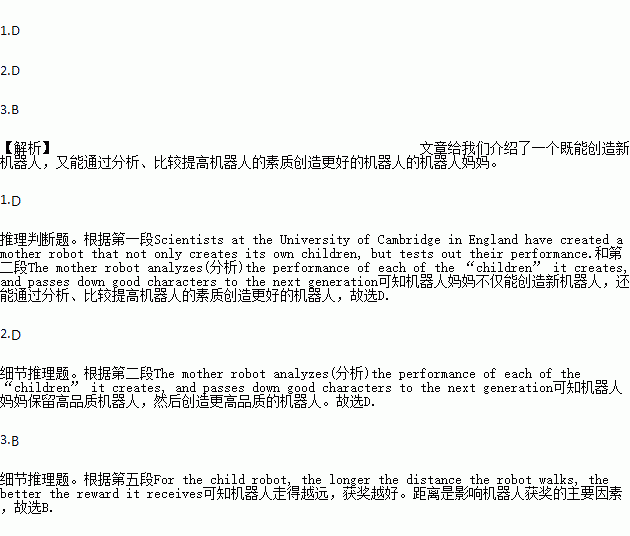题目内容
There is no doubt that many parents want to mold (塑造)their child to be better, faster, smarter and more skilled. Even though human parents can’t do that, a robot that builds its own children can. Scientists at the University of Cambridge in England have created a mother robot that not only creates its own children, but tests out their performance.
The mother robot analyzes(分析)the performance of each of the “children” it creates, and passes down good characters to the next generation. For example, as the mother creates them and puts them to work, she measures how they’re behaving, and she uses data from this behavior to create the next generation of robots.
The mother robot can actually build hundreds of child robots and see the performance of these child robots. And if their performance is good, keep their design for the next generation. And if bad, just let it go.
“We program the robots based on some functions that define(规定)the reward the robots are going to get, depending on the construction that they make. They cannot change their own reward. For the child robot, the longer the distance the robot walks, the better the reward it receives,” said Fumiya Iida, the lead researcher.
After several generations, the “children” were running twice as fast.
running twice as fast.
“The mother robot produced 500 robots to see which one is good and which one is bad,” said Iida.
The researchers believe that the machines can be used in a car factory, for example, where robot cameras examine each ear in production line, find out any mistakes, and then design a better car.
1.What is special about the mother robot?
A. It can analyze data
B. It can create child robots
C. It’s smarter than human mothers
D. It can build and improve its own children.
2.How does the mother robot mold her own children to be better?
A. It teachers them how to behave better.
B. It reprograms the bad ones after analyzing their performance
C. It copies hundreds of child robots and then chooses the best ones.
D. It keeps the good characters for the next generation to create a better robot.
3.What is the key point in influencing the child robot to receive a reward?
A. Size B. Distance.
C. Behavior D. Speed.


 -minded and brave person makes my life more joyful. I was ____, but I found my way.
-minded and brave person makes my life more joyful. I was ____, but I found my way.